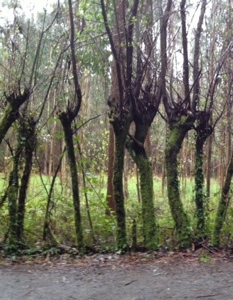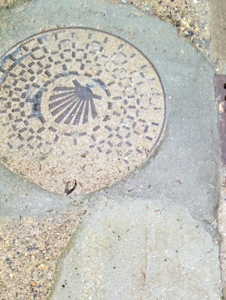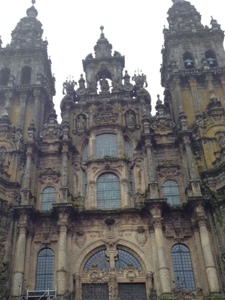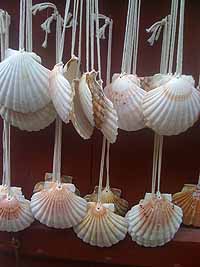Ultreïa
As I came out from under a canopy of trees, the skies opened up. The rain had been steady all morning, something like a constant sprinkler, but now it came down in sheets. In just minutes, I was drenched. During the days before, the rain had been gentle or playful, intermittent, volleying back and forth with the sun. This morning it was unyielding. The wetness was inescapable. I have rain  pants and a Gortex jacket, but this kind of rain finds its way under your sleeves and seeps into your clothes. I pulled the strings of my hood tight, closing it around my head. I leaned in to the rain and the wind, focused on my muddy boots. One foot in front of the other, step by step. Just a little further to go.
pants and a Gortex jacket, but this kind of rain finds its way under your sleeves and seeps into your clothes. I pulled the strings of my hood tight, closing it around my head. I leaned in to the rain and the wind, focused on my muddy boots. One foot in front of the other, step by step. Just a little further to go.
The night before, at dinner, a new friend – I appreciated having some company after so many days of eating alone – asked if I ever listened to music while walking, and if it might be interesting to listen to Oliver Schroer‘s recording, Camino, on my final leg into Santiago. He’d learned about Schroer from one of my blog posts, and even downloaded the album for himself. I haven’t listened to the music function on my phone at all during the Camino. I carry the earbuds only to transcribe, in the evenings, what I may have dictated during the day using a recording app. A string of words will come to me and if I want to remember them, I have to capture them quickly. These little snippets become aural markers of the route; musings with the sound effects of my footsteps, birds and dogs and passing tractors. Other than that I’ve tried to leave my phone in my pocket, except to take an occasional photograph. I prefer to be present – sight and sound – with the walking experience.
It wasn’t until this very wet moment that I remembered his suggestion to have a soundtrack to accompany me into Santiago. Ahead there was a tunnel under the highway. I stopped beneath it, set my backpack down on “dryer” ground and dug deep inside to find the plastic bag with my earphones. I selected the music, figured out how to tuck in the wires and keep (hopefully) electronic things dry. When I emerged from under the overpass, the rain pounded against me, almost horizontally.
The first song started out jubilantly. It made me smile, buoying me as I ventured out from the cover into the downpour. But the chords soon turned minor and introspective, matching the somber rhythm of the relentless rain. It was kind of a perfect storm: a violin playing in a minor key, every note enhanced by the acoustics of ancient churches along the Camino, played by a man who died of the same disease as my mother. This, on the last day of my way to Santiago, another ending. It wasn’t my intention when I put the music on, to put myself into a state. But there I was, marching along, dripping, drenched, so wet that I didn’t even try not to get wet anymore. The rain  dripping off my hood into my eyes, the rain dripping from my nose and eyelashes. The rain, the music, the end, all of it dripping together. That’s when I began to weep.
dripping off my hood into my eyes, the rain dripping from my nose and eyelashes. The rain, the music, the end, all of it dripping together. That’s when I began to weep.
Why was I crying? I wasn’t sure: I thought I was glad and proud to be finishing the Camino. Then I recognized it, the feeling. It was grief. I was grieving the end of this walk, a journey that I had been planning and looking forward to – and in the midst of – for over a year. I was grieving some part of me, a part I don’t need anymore, but a part I was used to. I was grieving, again, good people who’ve passed on: my mother and my father, grandparents, my friend Dilts and the pilgrim I hardly knew, Mark from Michigan, the one who shared his olives with me the day before he died. Another friend called Bomber. Not that we were close, but that it’s recent and he was young. A whole list of people who now live only in the world of memory. The violin played on, track after track. My tears indistinguishable from the rain.
~ ~ ~
For the last week I’d been toying with the idea of continuing on the Camino, after Santiago, to Finisterre, the furthest outpost of land on the European continent, the edge of the old world. The Camino extends beyond Santiago to the two coastal towns of Finisterre and Muxia, 90 kilometers further. When I planned this last leg, I estimated 12 days to Santiago, but I bought a return ticket a few days later, a buffer in case I needed a day midway to rest, or for an extra day in Santiago, to go to the pilgrim’s mass. When I found myself making better time than I expected, going further, all the way to the ocean, became a real possibility.
Ultreïa means to keep going, or literally, still further. The term comes from Latin, it’s heard in a French song about the Camino, and I heard it and saw it written in various forms along the route. I had understood it as an encouragement to keep going, to go further than you think you can. As I approached Santiago, I felt this call, Ultreïa. Since I am not particularly religious, the Cathedral and its pomp and circumstance and the sin-expiating power of the compostela carried less weight for me than simply making the journey. If anything, it made more sense for me to end this pilgrimage not at a big church, but instead at the western coast of Europe and the Atlantic ocean.
The Camino was originally a pagan route, and the Christianization of the region involved incorporating this ritualized road of the Druids and the Celts who were here first. I also heard that the original St. James pilgrims had to walk all the way to Finisterre first. To prove that they’d done so, they had pick up a scallop shell, distinctive to the area, and bring it back to Santiago. This is how the shell became the symbol of the pilgrimage. Nowadays it’s given to you when you start, or you can buy them along the way. Most pilgrims attach the shell to the back of their backpacks, like a badge, worn with pride.
~ ~ ~
It was raining too hard to even unzip my rain pants and reach into my pocket and pull out the map to check the distance to the next hamlet where I might find a café or bar to rest and dry out, or at least have a break from the rain. I kept walking and hoping – nearly praying – for a place to stop. Finally, a corner turned and a small casa rural with red and white checked tablecloths on the tables. I stood at the bar, unable to speak. The owner tried to offer me something in Spanish, and in English. Then he understood that I was too moved to speak or too wet to answer, or both. He left me alone for a few minutes so I could compose myself.
I wanted caldo, but it was only noon and the cook didn’t come until one o’clock. The proprietor said he could make me a sandwich but otherwise the kitchen was closed. Ten minutes later, he appeared with a bowl of soup. He must have heated it up himself. He poured me a glass of red wine and pointed to the heater where I could put my wet outer clothes to dry. I have insufficient words to describe my gratitude in that moment.
I could have stayed there. He had rooms. I could have checked in, had a warm bath, pulled myself together and hiked in the last 8 kilometers in the morning. It would have been an entirely reasonable solution, given the weather. But after the soup, and then a second course once the chef arrived, and a bit of time to rest and ready myself, there was no question. This was the day I was to arrive in Santiago. I was too close. I could go further still. Ultreïa!
~ ~ ~
The violin music was the right serenade for the walk through the initial urban sprawl of Santiago, I wish I’d thought to use music while traversing the outskirts of other larger cities along the route. It eased the discord between pilgrim and progress. The rain was merciless, but now I was laughing at it. As I approached the entrance to the city center, it let up slightly. I walked up the first narrow street into to the medieval part of the city, and just as the top of the spires of the cathedral came into view – I kid you not – the sun came out. Briefly, barely, but it was a brighter light beaming through a thinner cloud.
I approached the entrance to the city center, it let up slightly. I walked up the first narrow street into to the medieval part of the city, and just as the top of the spires of the cathedral came into view – I kid you not – the sun came out. Briefly, barely, but it was a brighter light beaming through a thinner cloud.
A bagpiper droned in the street, standing under an arch, playing a somber but celebratory march as I came around to the entrance of the cathedral. I’d stood there once before years ago, as a tourist, never imagining I would approach this grand stairway having walked 500 miles to get there. Strangers congratulated me. A tourist wanted to take my picture (“look, a real live pilgrim”). I wanted to laugh and to cry, so I did a little of both.
The next day, my Latin inscribed compostela in hand, I went back to the Cathedral. I’d heard my father’s voice in the back of my head, “You’ve walked this far, go to the mass.” I found the pew where he would have sat, a third of the way back on the left side. I tried to think of the last time I was at a Catholic mass. Maybe at someone’s wedding, years ago. I certainly don’t go to confession anymore; I’m not convinced that the priests’ sins aren’t worse than mine. I have little faith in the Church, a mixed-faith upbringing, and questionable faith in my daily practice. But I was still comforted by the familiarity and the rituals of the mass. It reminded me of my childhood, those long, boring services, about which my father used to say, “it’s a good time for thinking because nobody interrupts you.” So I sat and I thought and I meditated, and I stood up and I sat down and stood up and sat down. Just as I was getting restless like a kid in church, it was time for communion. I remembered how my father would give us the knowing nod, and we’d follow him up to the priest, take the host, and then follow him out the side door to the parking lot so we could get to the ski mountain or to the lake and to our little sunfish sailboat. De-facto‘s father used to pull the same stunt, sneaking out after communion. So I gave a knowing nod to both of our fathers,  and took my cue just as the others in my row stood up and moved to the center aisle, I picked up my pack and poles and scooted out, around the back of the church, nodding goodbye to familiar faces and fast friends made during the last days, and slipped out the side door.
and took my cue just as the others in my row stood up and moved to the center aisle, I picked up my pack and poles and scooted out, around the back of the church, nodding goodbye to familiar faces and fast friends made during the last days, and slipped out the side door.
I’d been to the Galician tourist office that morning, they gave me a walking map to Finisterre. I had to hunt around a bit, to find the first marker, indicating the route out of Santiago. Just at the edge of the square, between the city hall and the Parador, I found it. A bright yellow arrow, a familiar friend, pointing west, pointing me further still on my way. Ultreïa!



March 30th, 2013 at 8:46 am
Such a lovely post. I was almost in tears – for my own Mom, for “absent friends”, for Bomber…and then you mentioned Bomber. I’m so glad you found that sign on the way out of town to finish your trek on the real coast…you would have been sorry or sad if you hadn’t gone the extra distance. YFM girl.
April 1st, 2013 at 6:29 pm
What a joyous post! Wow! Wow!
I stopped and re-read sections a second time, and third as I walked (in reading). So. Much. Rain.
Rain and a clear head/mind.
Earlier, you were walking, and people were interrupting YOUR Camino. What were they thinking? Now there’s a new friend whose presence is welcomed.
For me, that’s the sin-expiating power of the Camino. The compostela is merely physical proof of what’s happened. The way a wedding ceremony points out what has already–hopefully–happened, but doesn’t “make” two people married.
On the Camino, as you’ve experienced and written, people invariably walk together for a while, lose track of each other, then find each other again. The etiquette of the albergues both reminds and fosters camaraderie. It’s no wonder people share grapes, and advise others on what to tip along the way.
I think I’ve mentioned, I fall in with those who look at Original Sin not as something having to do with a literal apple, but as a way of talking about the ease with which we get caught up in our own stuff, and forget that we’re all in ALL of this, together. It makes sense–to me–that you would think of, and grieve, the loss of those you’ve walked with, on the Camino of life, especially as this part of the walk was coming to a close.
I’m glad too, that you have a sense of “Ultreïa.” The ultreïa, will continue, even after you reach Finisterre. I can’t resist this play on words: it won’t finish there.
Oh–I should point out one obvious thing. Your Dad. De-facto’s. Dilts. Mark from Michigan. Bomber, and a host of others that you’ve been thinking about. They, and those of us who still walk with you? We share one thing in common: we’re damn proud of you. Bravo!
April 3rd, 2013 at 3:27 pm
Beautiful writing – the peak of your spirit and your being! And that heavy rain which falls in all our lives and also gives us gifts in the end….
I relish the bits of history you give us, and mourn with you for those beloved travelers who have already passed this way.
This Camino tale is a rare and expressive essay — what might you do with it next?